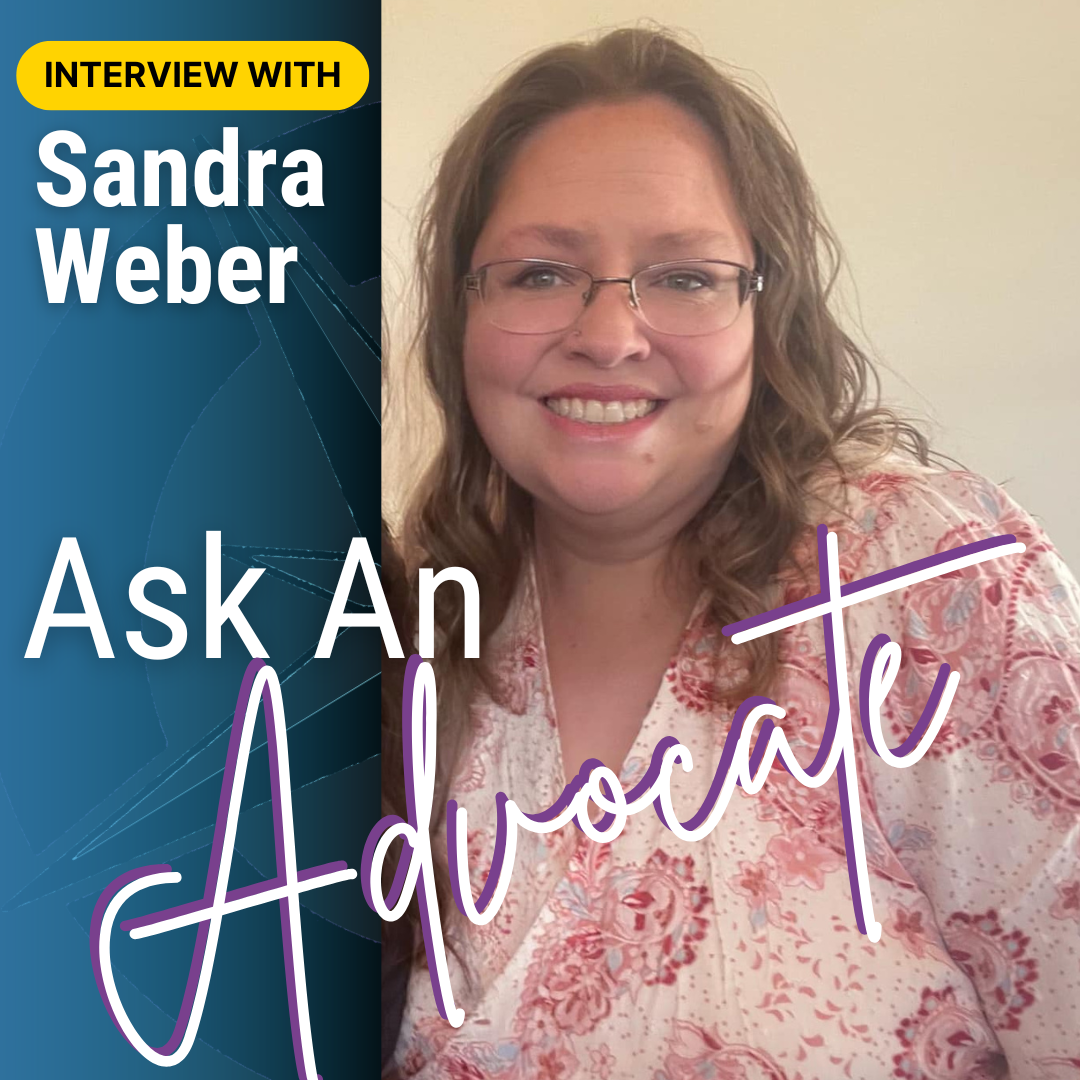We’re delighted to spotlight Sandra Weber in our ‘Ask An Advocate’ series! Sandra has been with Options for 2 and 1/2 years, serving as a compassionate Weekend Advocate.
Known for her loving, empathetic, and calming presence, Sandra is a source of comfort and kindness to everyone she supports. Her approach to advocacy makes a meaningful impact on the lives of our clients, and we’re excited to share more about her important role within our team.
Can you describe your primary responsibilities as an advocate?
“I am a weekend shelter advocate. Some of my responsibilities include taking hotline calls, attending SANEs, offering counselling, maintaining the safety of the shelter, transporting survivors, reaching out to find placement for survivors if the shelter is full, and generally just listening to survivors and being a source for them.”
What is unique about your role?
“It varies from day to day, survivor to survivor, and changes constantly. We try to develop the ability to think fast on our feet. When someone is in crisis, the first thing we are concerned about is their immediate safety. Once we make sure they are out of immediate danger, we ask questions to figure out what path to take with the individual that is going to have the most impact and success.”
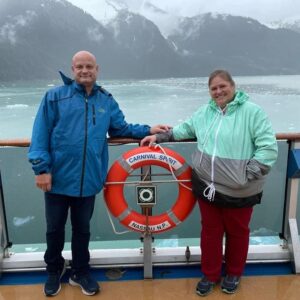 What do you believe is the most important aspect of your job as an advocate?
What do you believe is the most important aspect of your job as an advocate?
“The ability to offer assistance to someone in crisis. I feel like the first interaction you have with a survivor sets the tone for their openness to accept help. Of course, they have taken the first step by reaching out. Trying to dig deep to find the calmness and clarity that, as the person on the other end of a hotline call, you may not feel at all, can be challenging. Our help is not scripted, it is intuitive.”
What are some of the key challenges you face in your role and how do you address them?
“As a weekend advocate, many of the resources available during business hours, Monday – Friday, are not available. We must come up with solutions to get us through the weekend. Also, specifically as a weekend advocate, we come in “blind”. New clients, new household issues, not knowing what supplies are available and what we may be in need of. As you can imagine, we are always in need of something – food, toilet paper, cleaning supplies, and clothes for example. A survivor may come in with only what they are able to carry with them.”
Is there a particular service or program offered by Options that you find especially impactful or meaningful? If so, why?
“I think the fact that we have advocates that go out into our surrounding communities is vital. The availability of our services to these smaller communities is important. Not everyone has the means to get to our “Hub” cities.”
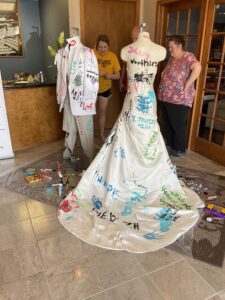 Can you share a memorable success story (while maintaining confidentiality) that highlights the impact of the work you do?
Can you share a memorable success story (while maintaining confidentiality) that highlights the impact of the work you do?
“I have seen clients I have worked with that have moved out of shelter, into their own homes or apartments, hold full time jobs, and become active in their communities. Knowing the depths of trauma and things they have had to overcome to function normally in society, it is a major feat. I am proud to know I had a part in that, however small it may have been.”
What has been your favorite training or professional development program you’ve attended/received since working with Options? What did you learn?
“I took a course through KU on Sexual Assault and Interpersonal Violence that was really good. I cannot remember the name of the lecturer, but he was a retired Special Victims detective and had great information.”
How do you practice self-care and prevent burnout, given the emotional intensity of the work?
“I try to take several short vacations a year. I spend time with my family which is very important to me. I take naps to re-energize my body. I like to relax in the evening by watching television and working on counted cross stitch. An occasional glass of wine is not unheard of as well.”
How do you build trust and rapport with survivors?
“I truly try to just listen intently to what they are saying to me. Offer multiple suggestions that may work for what they are feeling or experiencing. I realize that the same thing is not going to work for everyone. Everyone experiences trauma differently. What may look the same to us, may present very differently for them.”
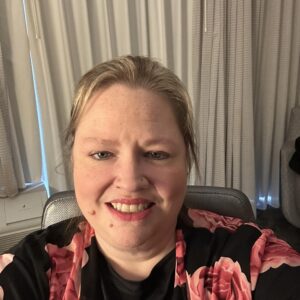 In your opinion, what are the most pressing issues facing survivors of domestic and sexual violence today?
In your opinion, what are the most pressing issues facing survivors of domestic and sexual violence today?
“I hate to say it but there is a lack of funding. Much of the time when people leave a domestic violence situation, they leave everything behind. Their house, their car, their documents. They are starting from scratch.”
Can you share any misconceptions about abuse that you encounter within your role?
“I think people are quick to think that individuals who experience abuse tend to be uneducated, unmotivated, impoverished people. In my experience, this is not the case. Anyone can be a victim of domestic violence or sexual assault. I also think people tend to downplay abuse if is it not physical. The ways in which a person can be abused by another are far more than just physical.”
How do you measure success? What does a successful day or client look like to you?
“Working with a survivor to build a well-rounded individual and watching them blossom from a trauma filled person to a confident, self-assured person with goals for the future is what I strive for. Making sure they know that Options is always there for them in the future if they need continued help is very important.”
What kind of changes or improvements would you like to see in the way society addresses domestic and sexual violence?
“My wish is that individuals and companies would support these causes in the same financial capacity as they do other causes. We need to encourage individuals to support shelters and events before they encounter someone in their personal lives who has been abused or raped. We need to stop these things from happening instead of just “fixing” things after they happen. We should treat dv/sa like we do medical issues. Educate or use “preventative medicine” to stop the spread of the disease. It is easier to pretend like this is not present in our communities. We only hear about it occasionally. But it is happening daily, even hourly, and we cannot put our blinders on and ignore it.”
What is your favorite way that Options raises awareness and educates the community about domestic or sexual violence?
“I love Rock Against Rape. I have attended and although it’s a little loud for my ears, I see the support it receives from the youth in our community. The bands that participate are very supportive of the cause and volunteer their time to bring this event to the community. I also like the What Were You Wearing display.”
What advice would you give to someone who wants to pursue a career in advocacy work for domestic and sexual violence?
“I would encourage them to follow their passion but caution them that it can take a toll on their own emotional and mental well-being. I think Options does a good job checking in with their advocates and facilitates self-care and counselling if it is needed. I like that they recognize that we can internalize the traumas of others into ourselves.”
What do you wish people understood about your role? Or about working as an advocate in general?
“I want people to know sometimes in role of advocate I just stand there and be a presence for the person I am with. Listening to them and letting them vent or cry. We don’t always have immediate answers. That is something we work toward, slowly and at a different pace for everyone. I have had people accuse me of using my role of advocate to try and make myself look good. I don’t do this to look good. I will say that having a positive impact on someone that is going through a rough time can make me feel good/give me a purpose.”
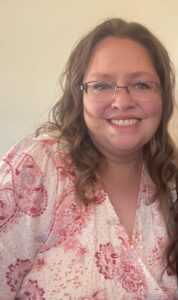 How do you handle difficult situations? Personally and professionally.
How do you handle difficult situations? Personally and professionally.
“Personally, that’s a hard question because when I am faced with a difficult situation my first instinct is to pull away and put space between myself and the situation. That’s my instinctive coping mechanism. I find myself repeating those patterns. I am the kind of person who does like to take a step back and think a situation through before reacting.
Professionally, I am somewhat the same. Rather than retreating from a situation though, I think most of the time I listen and find solutions. I like to be a sounding board for others to bounce their ideas off of. I love to work with other advocates to find solutions.”
How has working at the agency impacted your personal views or perspectives on domestic and sexual violence (or stalking, or human trafficking)?
“I can honestly say that for so long I was blissfully ignorant of the things that are happening in our communities. The extent to which another human can mistreat another human. The things that no person should be made to endure. We have got to do better educating ourselves and others on what is going on around us.”
What keeps you motivated and passionate about your work, even when it becomes difficult?
“I have seen progress; I have experienced when a survivor has an “aha” moment. I have been told that the work we do has impacted someone so much that they want to work to get better so they can help others. It’s truly an eye-opening experience. I try to keep things in perspective, not let it weigh me down and take over, but move forward with a purpose. My purpose – to do what I can and accept that I cannot do it alone. I love that at Options I have a whole team of people to bounce ideas off.”
If you need any additional information, have a question, or a concern, feel free to reach out to Options at our 24-hour toll-free helpline 800-794-4624. You can also reach an advocate via text by texting HOPE to 847411 or click 24-Hour Chat with Options.
This grant project is supported by the State General Fund for Domestic Violence and Sexual Assault, sub-grant number 24-SGF-07, as administered by the Kansas Governor’s Grants Program. The opinions, findings, conclusions or recommendations expressed in this publication are those of the author(s) and do not necessarily reflect the views of the Office of Kansas Governor.


